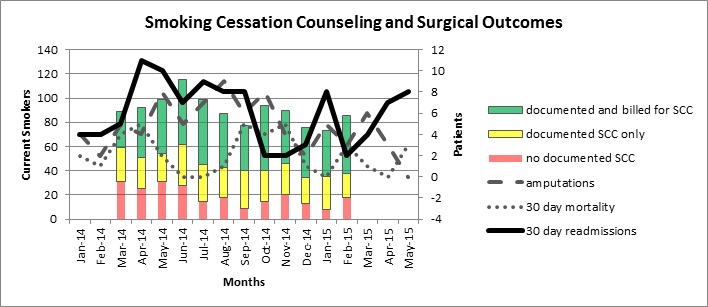Back to 2016 Annual Symposium Abstacts
Smoking Cessation Counseling Improves Quality of Care and Surgical Outcomes with Financial Gain for a Vascular Practice
Danielle Moses, James H. Mehaffey, Baldwin Mary, Margaret Clarke Tracci, John A. Kern, Gilbert R. Upchurch, Jr..
University of Virginia Health System, Charlottesville, VA, USA.
OBJECTIVES:To determine the association of smoking cessation counseling (SCC) with improved quality of care, surgical outcomes, and financial revenue.
METHODS: As a quality project using retrospective data, the study received IRB exemption status. A retrospective review of prospectively maintained database from April 2014 through March 2015 of encounters in a vascular surgery clinic was performed of current smokers. Providers were encouraged to counsel smokers to quit, document the discussion, and bill specific E/M codes (99406, 99407). The number of outpatients by smoking status, documentation and billing of SCC, demographics, and monetary collections were collected. Data was compared using a correlation coefficient calculated and tested for statistical significant using two-tailed T test.
RESULTS: A sample of 1077 visits by 612 currently smoking patients accounted for 24% of all visits. The average age was 61 years and 64% were male. Comorbidites included 77% with hypertension, 32% diabetes mellitus, and 14% chronic kidney disease. Medically, 72% were on aspirin, 71% statin, 48% beta blocker. A total of 208 (34%) never underwent a vascular intervention and 183 (30%) had an intervention during the study period (44% for PAD, 10% carotid stenosis, 14% amputations, 10% AAA). Documentation improved from 65% of encounters during the first month to 89% in the peak month and 79% of total encounters. All-cause mortality rate was 2% and this cohort demonstrated 75% SCC for 28 encounters. 55 patients (9%) quit smoking for more than 30 days at the end of the study period and this cohort had 69% of their 97 encounters with documented SCC.
Increased SCC was correlated with decreased 30-day readmissions during
the concurrent month (R = -0.711, p=0.009) and the following month (R = -0.719, p=0.008). There was a weak correlation with decreased amputations the following month (R = -0.5, p=0.08).
Financially, \ was collected for 33 pts with a potential for collections of \ predicted for minimum Medicare payment of one visit per patient.
CONCLUSIONS: Advising vascular patients in smoking cessation benefits both the patient and the health system. Proper documentation and billing decreases costs of early readmissions and increases departmental revenue.

Back to 2016 Annual Symposium Abstacts
|







